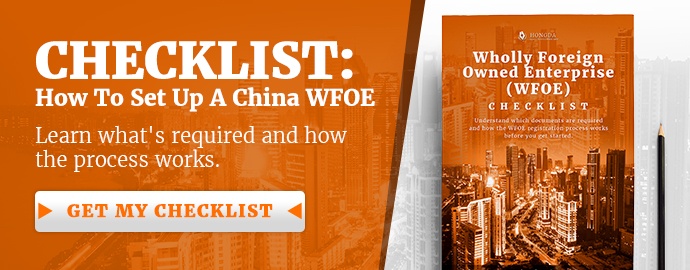Setting up a company and establishing a presence in China can be a challenging task, but with relevant information coming from experience and expertise you can save yourself a lot of trouble, here are a few crucial questions answered for your China Company Setup.
1.What Company Structure Should I Use?
China has three recognised forms of business organisations available to foreign investors who are looking to register a company in China, namely a Joint Ventures, Wholly Foreign-Owned Enterprise (WFOE) and a Representative Office.
Joint Ventures
In some instances the Chinese government encourage local companies to work with foreign companies through a Joint Venture partnership to gain technology and management expertise, which allows foreign companies a certain amount of access which would otherwise be inaccessible to foreign companies. This allows the foreign companies early access to the Chinese market and the ability to secure market share.
Wholly Foreign-Owned Enterprise (WFOE)
A WFOE is a business entity formed in China with foreign capital that is totally under foreign control and does not have any formal Chinese ownership participation. For a foreign company to be able to issue receipts and export goods from China, it must be legally registered as a local company or a WFOE. A WFOE is set up as a limited liability entity and represents separate legal persons and is taxed according to local legislation.
Representative Office
The most cost effective and simple method of establishing a business presence in China is a Representative Office, or Rep Office for short. High profile cities such as Shanghai, Beijing, Guangzhou or Shenzhen are the most likely choices for a Rep office. This kind of setup exists to allow a foreign parent company to conduct business meetings, perform quality control, promotion of products or services, and market research. A Rep Office is not a company which is allowed to do business and make profit, for these purposes you would need to look at a WFOE or Joint Venture.
2.How Much Does It Cost To Set Up?

The costs can change from time to time and varies significantly from one setup to another, therefore it is recommended that you contact a company dealing specifically with these procedures to see what the latest pricing is to make absolutely sure.
Joint Venture
This all depends on what kind of business you’re joining forces with and the nature of your agreement. However, the latest pricing indicated for a Consulting, Service or Hi-Tech Joint Venture registration range from anything between RMB 100,000~ RMB 500,000 ($15k -$75k USD) for the minimum investment capital required.
Wholly Foreign-Owned Enterprise (WFOE)
Even though China has moved to eliminate the minimum capital injection requirement “Registered Capital” as a condition for opening a WFOE, the reality of it is that each application will be reviewed on a case-by-case basis.
Chinese authorities at the Ministry of Commerce (MOFCOM) in the PRC will typically require a minimum commitment of between RMB 200k to RMB 500k, which is roughly between $30k -$73k USD, for a basic consulting WFOE (a manufacturing WFOE would normally be required to inject more registered capital but you can confirm this with a consultant at Hongda).
Representative Office
Setting up a representative office requires an enormous amount of paperwork and the bureaucracy can be a bit much, and if not carefully managed your expenses can quickly get out of hand.
There are an array of companies out there that will offer you an “express service setup” for as little as 4500 RMB, but beware as all is not as it seems! There are a serious amount of hidden costs involved here that they won’t tell you of, so better to know what you are letting yourself in for before you apply yourself to that option. Generally speaking you would be looking at around $5k - $k10 for a well structured and honest Representative Office setup package.
3.How Much TAXES Do I Have To Pay?

WFOEs and Joint Ventures:
For WFOE’S and JV’s in China there are two major taxes that need to be considered.
Turnover tax (this includes Business tax for a service and consulting business, VAT tax for trading and manufacturing business etc.) and, Income tax (corporate income tax, individual income tax).
- Business tax: Based on turnover 3-5% applies to the service-oriented part of the business;
- VAT tax: based on the Value added part of products, applies to trading and manufacturing businesses;
- Corporate income tax: based on gross profit is 25% nationwide (since Jan. 1st, 2008) except for High Tech businesses with tax incentives in special economic zones, and encouraged industries in Midwest China.
- Dividend tax: 20%, however, for public listed companies the dividend tax is only 10%
Representative Office
Representative office's tax in China used be based on 9% on expenses. Since March 2010 it was changed to approximately 13% according to new regulation from local taxation bureaus in Guangzhou, Shanghai, Beijing, Ningbo and Shenzhen. Once again it’s important to get up to date information from the experts.
Regardless of what China Company Setup you decide to go with, you have to make sure you do thorough research to better understand the regulatory environment regarding your specific sector or industry.
Are you currently working in China, thinking of setting up your own company? Perhaps you’ve been through some of the setups listed above?
What are some of the biggest challenges you were faced during the registration process?
Please leave a comment below and get advice directly from the horse’s mouth






